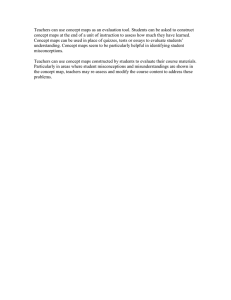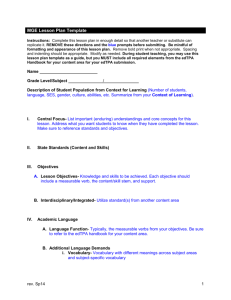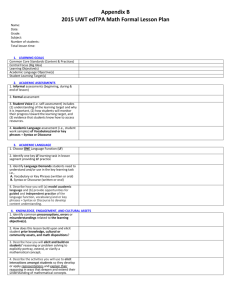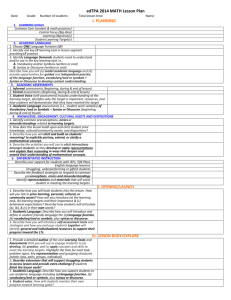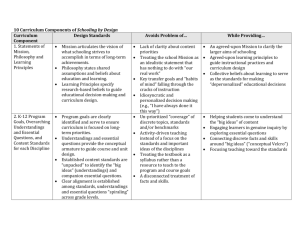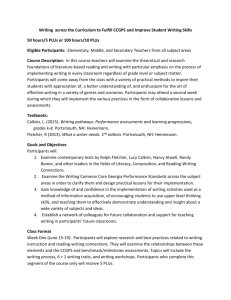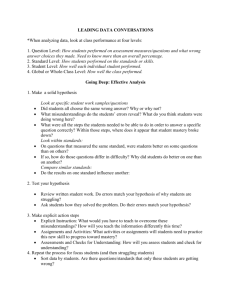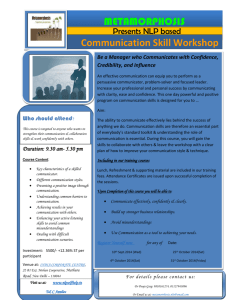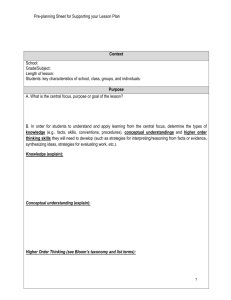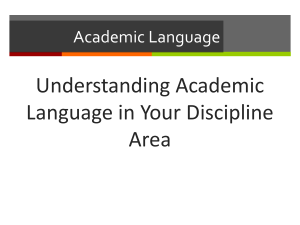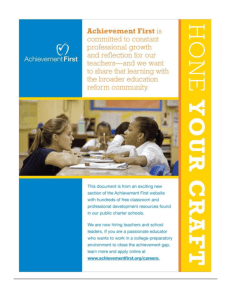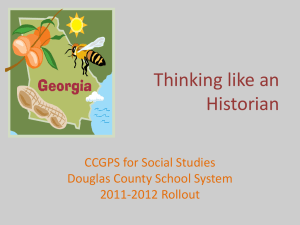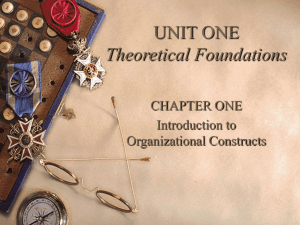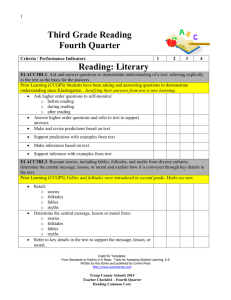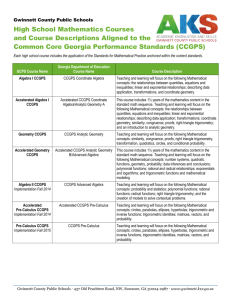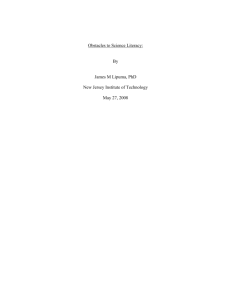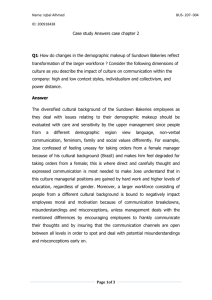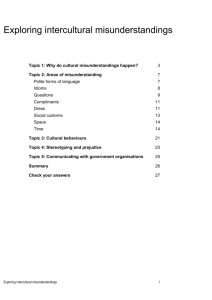Lesson Plan Template - Kennesaw State University
advertisement
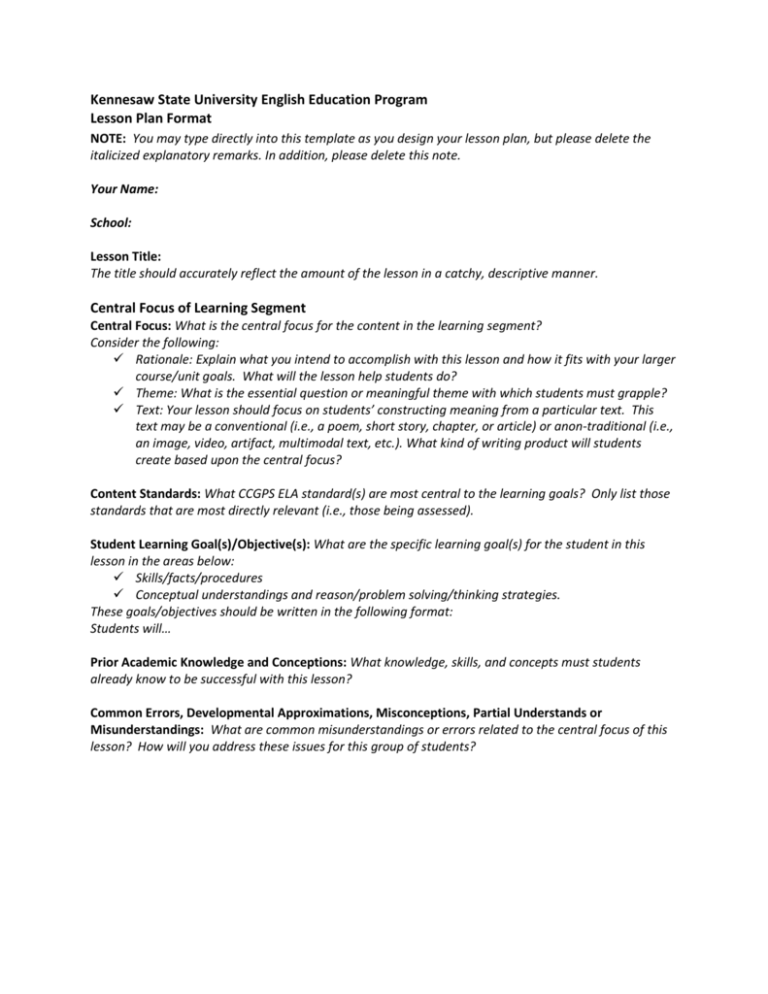
Kennesaw State University English Education Program Lesson Plan Format NOTE: You may type directly into this template as you design your lesson plan, but please delete the italicized explanatory remarks. In addition, please delete this note. Your Name: School: Lesson Title: The title should accurately reflect the amount of the lesson in a catchy, descriptive manner. Central Focus of Learning Segment Central Focus: What is the central focus for the content in the learning segment? Consider the following: Rationale: Explain what you intend to accomplish with this lesson and how it fits with your larger course/unit goals. What will the lesson help students do? Theme: What is the essential question or meaningful theme with which students must grapple? Text: Your lesson should focus on students’ constructing meaning from a particular text. This text may be a conventional (i.e., a poem, short story, chapter, or article) or anon-traditional (i.e., an image, video, artifact, multimodal text, etc.). What kind of writing product will students create based upon the central focus? Content Standards: What CCGPS ELA standard(s) are most central to the learning goals? Only list those standards that are most directly relevant (i.e., those being assessed). Student Learning Goal(s)/Objective(s): What are the specific learning goal(s) for the student in this lesson in the areas below: Skills/facts/procedures Conceptual understandings and reason/problem solving/thinking strategies. These goals/objectives should be written in the following format: Students will… Prior Academic Knowledge and Conceptions: What knowledge, skills, and concepts must students already know to be successful with this lesson? Common Errors, Developmental Approximations, Misconceptions, Partial Understands or Misunderstandings: What are common misunderstandings or errors related to the central focus of this lesson? How will you address these issues for this group of students? Instructional Strategies and Learning Tasks Launch/Activating: _______ Minutes How will you start the lesson to engage and motivate students in learning? Instruction: _______ Minutes What will you do to engage students in developing understanding of the lesson? How will you link the new content (skills and concepts) to students’ prior academic learning and their personal/cultural and community assets? What will you say and do? What questions will you ask? What examples and/or models will you use? How will you engage students to help them understand concepts? What will students do? How will you determine if students are meeting the intended learning objectives? Structured Practice and Application: _______ Minutes How will you give students the opportunity to practice so you can provide feedback? How will students apply what they have learned? How will you determine if students are meeting the intended learning objectives and/or standards? Closure: _______ Minutes How will you end the lessons? This is more than just telling them the homework assignment. You should consider reminding them what they learned, moving back to essential questions you addressed at the beginning of the lesson or wrapping up with a final thought or move to build for understanding. Differentiation/Planned Support: How will you provide students access to learning based on individual and group needs? How will you support students with gaps in the prior knowledge that is necessary to be successful in this lesson? Consider whole group work, grouping of students with similar needs, individual students, students with special needs and strategies for responding to common errors and misunderstanding, developmental approximations, misconceptions, partial understandings and/or misunderstandings. Student Interactions: How will you structure opportunities for students to work with partners or in groups? What criteria will you use in forming groups? What Ifs: What might not go as planned and how can you be ready to make adjustments? Theoretical Principles and/or Research-Based Best Practice: Why are the learning tasks appropriate for your students? Make specific references to theory, research, ad reading that guide your decisions. Show that your plans align with good practice in English Language Arts. Materials: What materials does the teacher need for the lesson? What materials do the students need for the lesson? Academic Language Demand(s) What language function do you want students to develop in this lesson? (E.g., analyze, interpret, argue, evaluate, create, classify, etc.) What must students understand in order to be intellectually engage in the lesson? What content specific terms (vocabulary) do students need to support learning of the learning objective for this lesson? What specific way(s) will students need to use language (reading, writing, listening and/or speaking) to participate in learning tasks and demonstrate their learning for this lesson? Specifically, what are the syntax or discourse expectations of the lesson? What are your students’ abilities with regard to the oral and written language associated with the lesson? (E.g., if students are to evaluate the effectiveness of a text on a certain audience, what foundational skills will they need to e successful?) How will you support students s they can understand and use the language associated with the language functions and other demands (i.e., syntax or discourse) in meeting the learning objectives of the lesson? What tools will you use to help them? Assessments Type of assessment (informal or formal) Description of assessment Evaluation Criteria: What evidence of students learning (related to the learning objectives and central focus) does the assessment provide? How does the assessment align with CCGPS in meeting those standards? Resources Attach all necessary materials for the lesson (i.e., handouts, PowerPoint, teaching notes, discussion questions, assessment and associated evaluationcriteria/rubric).
